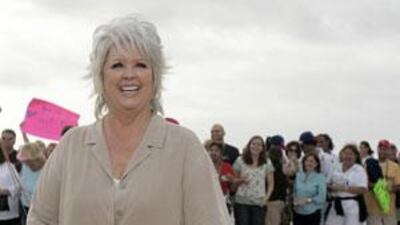Monday was International Women's Day. I didn't watch the Oscars, but newspaper headlines informed me that Kathryn Bigelow had become the first woman to win an Academy Award for Best Director. I made a mental note to rent The Hurt Locker, not in an expression of feminist solidarity, but because I really want to watch it. I don't like sexism anywhere near me before I'd had my coffee, and it's evil twin, reverse sexism, is even less palatable. In addition to the Oscars, I also forgo cooking shows, which I find either frustratingly tempting or frustratingly tedious compared with the tactile experience of switching off the TV and turning on the oven. But not everyone is so cantankerous and restless; the food show-watching public maintains a steady fascination with the workings of restaurant kitchens and the drama perpetuating them.
An online image search of the word "chef" results in a smattering of thumbnails featuring tubby cartoon men with curlicue moustaches. "Chef" might conjure a mental snapshot of a dark and stormy pirate ship fuelled by black coffee, elbow grease and testosterone, manned by an abrasive but inexplicably compelling captain with an adrenalin addiction, a gorgeous wife and a few best-selling cookbooks strapped to his apron strings.
According to Forbes, the 10 highest-paid "chefs" in the US include eight professional male chefs and two women: Rachael Ray and Paula Deen, both of whom are self-described home cooks and neither of whom has ever run a restaurant kitchen. Deen's website even attempts to lure sentimental browsers with memories of "mama's kitchen", though each of us carries our own lunch box on that walk down memory lane and some are gladder jaunts than others. But even as a feminist - no, especially as a feminist - I'd rather see 10 men listed as the highest-paid chefs in America than the names of two token women who probably shouldn't even have been in the running, regardless of their financial success. And I had something new to be irritated by when, in February 2009, Forbes published a list of the Ten Most Influential Women Chefs, which included Martha Stewart, the Top Chef host and model Padma Lakshmi and Betty Crocker, who is fictional.
Ironically, it seems that women are now in a position to fight for re-entry into the kitchen. For all the arbitrary, ridiculous and risible ways that the perceived realms of womenfolk have been misrepresented as emasculating (childbirth, from what I understand, isn't exactly for the faint of heart), the modern kitchen has presented an increasingly grey area. Why are so few female chefs drawn to the helm of restaurant kitchens? While in many parts of the world, the home kitchen is a gender-neutral space where both men and women can comfortably coexist and even exchange duties, the same cannot be said of restaurants. Professional kitchens have traditionally been run by men, while a woman's scope has generally been limited to the home kitchen, and she to the gathering, cooking and serving of food within it.
Every male-dominated industry is laden with inobvious forms of sexism that are far more subtle than a brazen wandering hand or a catcall. In the end, gender isn't really relevant if you're examining a person's skill set. I have to wonder, though, if women are under consistent pressure to produce better results in order to earn the same status and respect as our male peers? Conversely, are our accomplishments sometimes weighted in favour of our presumed inferiority, so that we're given extra kudos when they're uncalled for?
Women still comprise only 10 per cent of the executive chef positions in the US and we make an average of 17 per cent less than males in the same position. Does the industry elbow women out of leadership roles in the kitchen, or are we self-selecting ourselves out? Perhaps, in the end, none of these statistics are remarkable. After all, in many industries, the percentage of women who achieve higher-level positions is tiny, so perhaps it should come as no surprise that the same applies to chefs.
Is there a media bias against female chefs, or, as a (woman) chef friend asked me, are women just inherently less willing to self-promote? Some believe that the Michelin rankings are biased towards men; there are only four female three-star chefs in the world. The UAE has no shortage of accomplished home cooks, but few Emiratis are running restaurant kitchens, and none of them is a woman. There are innumerable cultural, anthropological, economic and sociopolitical implications to illuminate these statistics. Many believe that the explanation is as simple as the terrible hours and brutal physicality of restaurant work. This could explain why so many women chefs are drawn to catering and personal chef services and pastry (they comprise almost 80 per cent of all pastry chefs and bakers): flexible hours, and because most baking happens in the mornings, the work tends not to be as disruptive to family life, in case Chef happens to moonlight as Mum, or vice versa. There's a preconception that women are prone to crumble beneath the stress of a restaurant kitchen. But that's a tough sell, given that the field of emergency nursing is dominated by women and is hardly what one might call a cakewalk.

